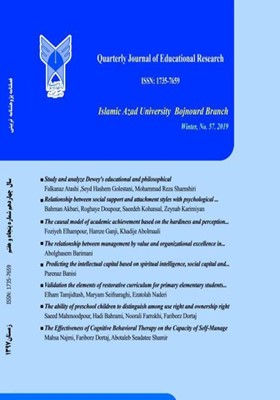Relationship between social support and attachment styles with psychological well-being of university students
Subject Areas : Educational ScienceBahman Akbari 1 , Roghaye Doupour 2 , Saeedeh Kohansal 3 , Zeynab Karimiyan 4
1 - Associate Prof, Department of Psychology, Rasht Branch, Islamic Azad University, Rasht, Iran
2 - MA, Department of Psychology, Rasht Branch, Islamic Azad University, Rasht, Iran
3 - Department of Psychology, Rasht Branch, Islamic Azad University, Rasht, Iran
4 - Department of Psychology, Rasht Branch, Islamic Azad University, Rasht, Iran
Keywords: Psychological well-being, attachment styles, social support, university students,
Abstract :
Psychological well-being effect on many aspects of life and have an important role in health and quality of life. As a result, present research aimed to determine the relationship between social support and attachment styles with psychological well-being of university students. This study was a cross-sectional from type of correlation. Research population was included all university students of Islamic Azad University of Rasht branch in 2016-17 academic years which from them 384 people were selected by multistep cluster sampling method. To collect data used from the questionnaire of Vaux & et al social support (1986), Collins & Read attachment styles (1990) and Ryff & Singer psychological well-being (2006). The data were analyzed by Pearson correlation coefficient and multiple regression with using SPSS-23. The findings showed that social support and secure attachment style have a positive and significant relationship with psychological well-being of university students and avoidance and ambivalent insecure attachment styles have a negative and significant relationship with psychological well-being of university students. Also, the variables of social support and attachment styles significantly predict 46/5 percent of psychological well-being of university students (P<0/05). Therefore, counselors and therapists to improve the psychological well-being of university students by the workshop can increase the rate of social support and secure attachment style and decrease the rate of avoidance and ambivalent insecure attachment styles.
_||_


